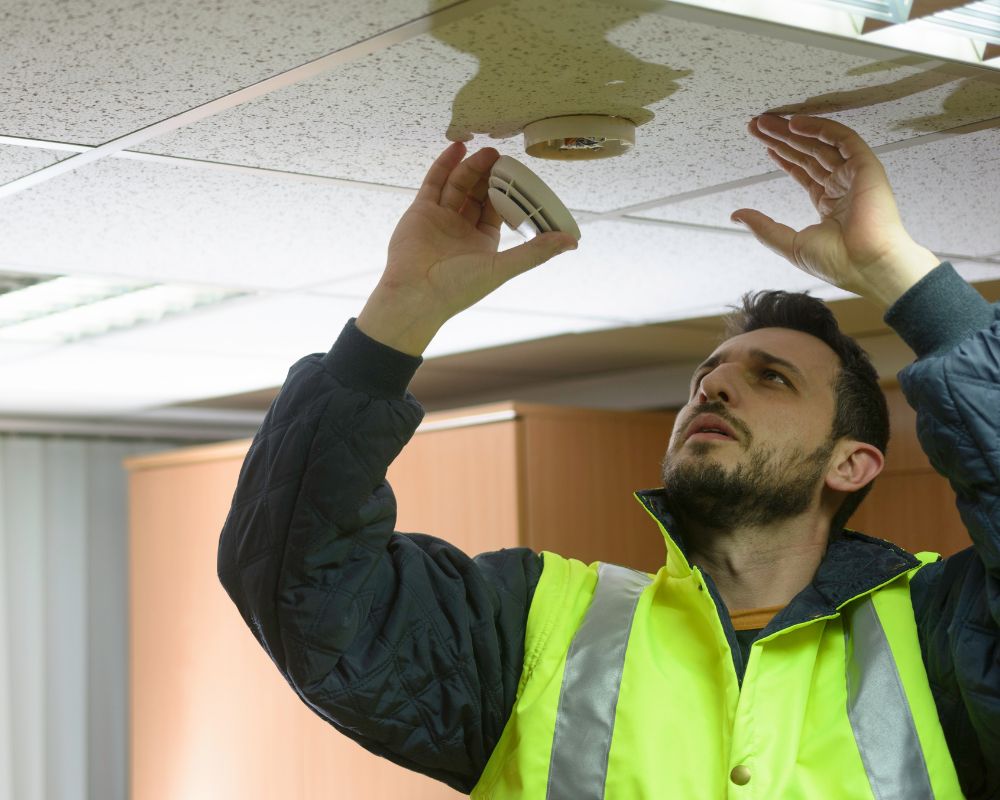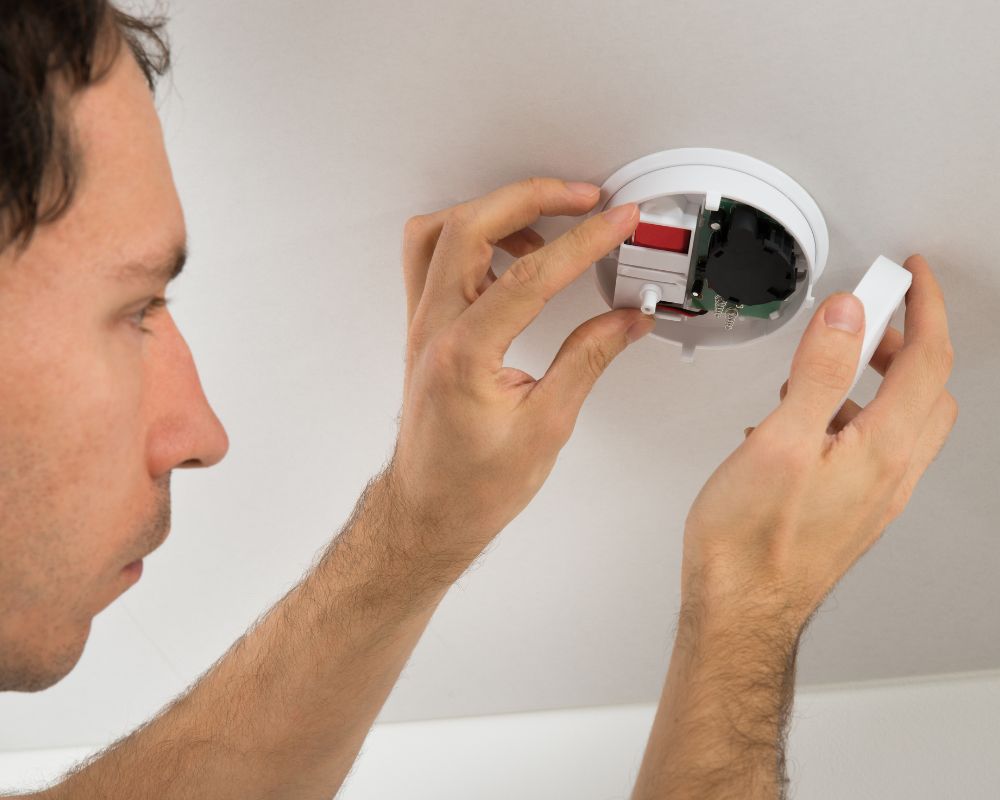Wondering why and how to fix Smoke alarms going off for no reason hard-wired? Smoke alarms can be a real nuisance when they decide to go off for no reason – although it’s usually an inconvenience, it turns into an emergency when hard-wired smoke alarms are involved.
In this blog, we’ll discuss what causes hard-wired smoke alarms to go off even when there isn’t any smoke present and the steps to take in order to stop them from randomly going off. In addition, check Carbon Monoxide Detector Goes Off in Middle of Night, Prepare yourself for some informative insights!
Reason why Smoke alarms going off for no reason hard-wired

Smoke alarms that are hard-wired can cause a frustrating and sometimes dangerous situation when they go off without a valid reason. It is important to understand why this is happening in order to properly address the issue. Generally, there are three common reasons why smoke alarms will go off for no reason when hard-wired:
1. Intermittent power supply
When there are frequent power outages or surges from the electrical source, an intermittent power supply can cause an intermittent signal to the smoke alarm. This may cause it to intermittently sound its alarm for short periods of time until the voltage level is restored to normal.
2. Age of the Unit
As smoke detectors reach a certain age, their sensors may become unreliable or malfunction due to a buildup of dust and dirt inside them. This can lead to false alarms that occur when there is no real threat of fire present since the sensor has become overly sensitive in detecting even the most minuscule amounts of smoke or particles.
3. Incorrect Installation
Incorrect installation of wired smoke alarm systems can result in false alarms if wires are crossed or installed in a manner that creates an electrical current loop between them. This issue can generate an electromagnetic interference which mimics that of genuine heat and/or smoke signals resulting in sound activation despite no actual emergency occurring.
4. High Chemical Fumes In The Surrounding
It is not uncommon for chemical fumes to trigger smoke detectors. Smoke detectors are designed to detect the presence of particles in the air that are associated with fire, and chemical fumes can sometimes contain these types of particles. If the chemical fumes are strong enough, they may cause the smoke detectors to go off.
If the smoke detectors in your building are going off due to chemical fumes, it is important to address the issue as soon as possible. Depending on the type of chemical fumes that are present, they may pose a serious health hazard to the occupants of the building. In some cases, the fumes may be toxic or flammable, which could lead to a fire or explosion if not properly managed.
5. Dust Accumulation
Dust accumulation can sometimes cause smoke detectors to go off. This can happen when a large amount of dust accumulates on the sensors of the smoke detector, causing them to become oversensitive and trigger an alarm.
Dust accumulation can also cause false alarms if it gets into the internal workings of the smoke detector and interferes with its normal operation.
6. Heat From The Fireplace
It is possible for heat from a fireplace to cause a smoke detector to go off. This can happen when the heat from the fireplace causes the air in the room to become more humid, which can trigger the sensors on the smoke detector. It can also happen if the smoke detector is located too close to the fireplace, as the heat and smoke from the fireplace may trigger the detector.
7. Increased Humidity In The Surrounding
The dangers of smoke alarms going off due to increased humidity in the surrounding environment cannot be overstated. A false alarm triggered by a sudden increase in humidity can cause fear and confusion for all those involved, as well as damage to the alarm system itself. This is why it’s important for homeowners to ensure their hard-wired smoke alarms are properly sealed and that they regularly monitor and clean them.
Smoke alarms are designed with humidity sensors that detect a rise in moisture levels in the air, which can then activate the fire alarm even when there is no actual fire present. Homeowners should check their systems regularly, especially if they notice any odd beeping or chirping noises coming from their alarms. If this happens, it’s best to have a professional come out and inspect the system so they can identify any potential issues before they become more serious problems.
How to fix Smoke alarms going off for no reason hard-wired
If your smoke alarms are hard-wired, then it can be hard to know what to do when they go off for no apparent reason. Fortunately, there are some steps you can take to diagnose and repair the issue.
1. Fix Smoke Hard-Wired Alarms Going Off because of Intermittent power supply
If your smoke detectors are going off due to intermittent power supply, there are a few steps you can take to fix the problem:
- Check the batteries. Make sure that the batteries in the smoke detectors are fresh and fully charged. Intermittent power supply can cause the batteries to drain faster, which can cause false alarms.
- Check the wiring. Make sure that the wiring for the smoke detectors is secure and that there are no loose or frayed wires. Intermittent power supply can sometimes cause the wiring to become damaged, which can lead to false alarms.
- Check the circuit breaker. If the circuit breaker for the smoke detectors has tripped, reset it to see if this resolves the issue.
- Check the power source. Make sure that the power source for the smoke detectors is stable and that there are no problems with the electrical outlet or other power source.
- Check for other sources of interference. Make sure that the smoke detectors are not located near sources of heat or moisture, as these can also cause false alarms.
2. Fixing incorrect Installation & Wiring Problem
If your smoke detectors are going off due to incorrect installation, there are a few steps you can take to fix the problem:
- Check the installation instructions. Make sure that the smoke detectors were installed according to the manufacturer’s instructions. If the smoke detectors were not installed correctly, they may not function properly and could trigger false alarms.
- Check the wiring. Make sure that the wiring for the smoke detectors is secure and that there are no loose or frayed wires. Incorrect wiring can cause the smoke detectors to malfunction and trigger false alarms.
- Consult a professional. If you are unable to identify the cause of the false alarms or are unsure how to fix the problem, it may be necessary to consult a professional for assistance. A trained technician can identify the cause of the false alarms and recommend a solution.
3. Fixing Dust Accumulation
Clean the smoke detector. Use a dry, soft cloth or a vacuum with a soft brush attachment to gently remove dust and debris from the surface of the smoke detector. Be careful not to damage the sensors or other internal components of the smoke detector.
4. Heat From The Fireplace & Humidity
Keep the fireplace clean. A dirty fireplace can produce more smoke and heat, which can increase the risk of false alarms. Make sure to regularly clean the fireplace and remove any built-up creosote or soot.
Keep the humidity levels in the room within a normal range. Aim for humidity levels between 30% and 50%. Use a humidifier or dehumidifier to help maintain the proper humidity levels.
Consider using a heat-resistant or humidity-resistant smoke detector. Some smoke detectors are designed to be more resistant to heat and humidity and are less likely to be triggered by these conditions.
What do you do when your wired smoke detector goes off?

When a hard-wired smoke alarm goes off, it’s important to determine the cause of the alarm. The most common causes are an increase in humidity, a lack of proper maintenance, or debris that has lodged inside the detector. In some cases, heat damage may be causing it to trip.
1. Check the cause
The first step is to immediately check for signs of smoke or fire in your home before attempting to investigate further. If there is no visible evidence of smoke or fire and you are sure that the alarm was triggered by an electrical malfunction and not by an actual emergency situation, then it is best to have a licensed electrician inspect your wiring and system before resetting it.
2. Attempt Necessary repair
Have any necessary repairs made and ensure that your detector is properly maintained according to manufacturer instructions before using again.
It’s also important to remember that improper alignment or age can result in false alarms as well. Most detectors need a thorough cleaning twice a year with canned air or compressed air in order for them work properly— see your manufacturer’s instructions for specific details about this process. Replace detectors every 10 years (even if they appear undamaged), as even with proper maintenance the electronics inside deteriorate over time making them unreliable and prone to false alarms.







